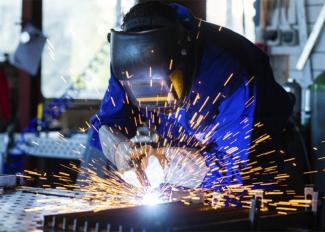A program supported by NETL will prepare a new generation of welders in the use of advanced alloys that will enable electric generating stations to run with greater efficiency, produce fewer greenhouse gas emissions and supply affordable electricity using the nation’s abundant fossil energy resources.
Today, the Appalachian Regional Commission (ARC), the Lab’s partner in the Advanced Welding Workforce Initiative (AWWI), issued a request for proposals (RFP) inviting states, counties and cities, institutions of higher education, unions and other organizations to develop training programs to teach high-tech welding skills that can be used in the energy sector.
These skills will also be broadly applicable for positions in the emerging aerospace, aviation, automotive and petrochemical industries, which will need welders and other employees with expertise in working with high-performance materials.
The majority of the program’s funding, $750,000, will be provided by the U.S. Department of Energy’s (DOE) Office and Fossil Energy High-Performance Materials program. ARC, a federal economic development agency that serves West Virginia and portions of 12 other states, is contributing $250,000. Proposals are due by 5 p.m. EST Friday, Nov. 13, 2020. Application guidance and other information is available at arc.gov/awwi.
A workforce trained to use advanced welding techniques and materials, such as gas tungsten arc welding and cobalt- and nickel-based superalloys, will be instrumental in updating the current fleet of coal- and natural gas-fueled electric generating stations and developing state-of-the-art fossil energy plants.
Such plants operate at significantly higher temperatures and pressures, which increases efficiency and lowers emissions of carbon dioxide, a greenhouse gas, but requires the use of superalloys that can withstand the harsh conditions. The development and use of advanced high-performance materials are crucial to operating low- and near-zero emission plants powered by Appalachia’s abundant reserves of coal and gas.
“The AWWI program will produce multiple benefits for Appalachia and the United States,” said NETL Director Brian Anderson. “It’s a prime example of how NETL can partner with other government agencies to generate clean, abundant and affordable energy while helping workers learn valuable skills for employment in energy and in emerging industries as well.”
“The value chain associated with the emerging natural gas and petrochemical industry cluster in Appalachia will continue to yield new opportunities for good jobs in growing fields, like advanced welding,” said ARC Federal Co-Chairman Tim Thomas.
As outlined in the RFP, successful AWWI applications will:
- Create a pipeline of qualified workers who can apply the latest high-temperature materials, manufacturing processes and service/repair techniques developed in DOE’s High-Performance Materials program for use in the nation’s power generation infrastructure.
- Design and implement comprehensive training programs in advanced manufacturing for careers in the energy, automotive, aerospace, aviation and petrochemical industries.
- Enroll displaced workers, new entrants to the workforce, incumbent workers and individuals recovering from substance abuse disorders into the programs.
- Specify the number of individuals anticipated to be served by the proposed training and include a system to track how many obtain new employment or enhance their current employment.
NETL and ARC anticipate the majority of forthcoming AWWI awards will serve communities in North, North Central and Central Appalachia. Special consideration will be given to proposed programs serving designated federal Opportunity Zones within Appalachia.
Training programs launched through the AWWI will help those areas capitalize on positive economic trends and forecasts.
For example, The Appalachian Energy and Petrochemical Renaissance: An Examination of Economic Progress and Opportunities, a report released by the DOE in June 2020 , found that petrochemical manufacturing projects currently in development in Appalachia are projected to attract between $16 billion and $20 billion in capital investment, and create more than 9,800 jobs directly and indirectly in Appalachia by 2025.
Assessing the Export Potential for High-Performance Materials and High Performance Alloy Applications in Adjacent Marketsreleased by DOE in October 2019 and June 2020, respectively, found that there were significant opportunities to leverage high-performance materials research supported by DOE’s Office of Fossil Energy beyond coal- and gas-fired power plants.
According to the reports, the global high-performance materials market generated more than $4 billion in revenue in 2016, which is expected to increase to $7.6 billion in 2023. The largest application of high-performance materials is aerospace, followed by industrial gas turbines, industrial and chemical processing and automotive.
NETL is a U.S. Department of Energy national laboratory that produces technological solutions for America’s energy challenges. From developing creative innovations and efficient energy systems that make coal more competitive, to advancing technologies that enhance oil and natural gas extraction and transmission processes, NETL research is providing breakthroughs and discoveries that support domestic energy initiatives, stimulate a growing economy, and improve the health, safety and security of all Americans. Highly skilled men and women at NETL’s sites in Albany, Oregon; Anchorage, Alaska; Houston, Texas; Morgantown, West Virginia; and Pittsburgh, Pennsylvania conduct a broad range of research activities that support DOE’s mission to advance the national, economic and energy security of the United States.
The Appalachian Regional Commission is an economic development partnership agency of the federal government and 13 state governments focusing on 420 counties across the Appalachian Region. ARC’s mission is to innovate, partner and invest to build community capacity and strengthen economic growth in Appalachia.




